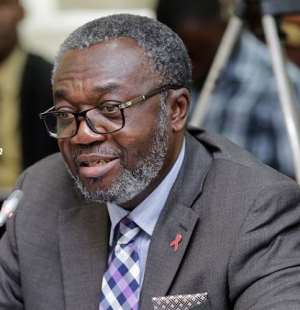
The 17th Annual General Meeting (AGM) of the Medical Superintendent' Group of Ghana opened in Takoradi on Wednesday with a call on the members to ensure quality health care delivery in rural areas.
The five-day event on theme 'Eliminating TB towards achieving a Ghana beyond Aid, was attended by more than 100 participants drawn from the various district hospitals and health centres throughout the country.
The AGM will deliberate on issues including, medical records policy, no bed syndrome and E-tools for quality assurance, Ghana TB situation and progress in ending TB.
It would also to discuss intervention, approaches in finding the TB missing cases, roles and responsibilities of medical superintendents/district directors in the success of implementation of intensive case finding, optimum use of GeneXpert testing and digital X-ray and quality structure for implementing the national quality strategy within the Ghana health service.
Dr Anthony Nsiah-Asare Director General of the Ghana Health Service, addressing the group described the theme as timely and appropriate, noting that Tuberculosis has been and remains one of the biggest killers among the infectious diseases afflicting Humankind, stressing that it was also the main cause of deaths related to antimicrobial resistance and the leading killer among persons living with HIV.
He noted that globally TB was still responsible for the deaths of about 1.5 million people annually.
Dr Nsiah-Asare said in Ghana the mortality rate was reported to be 7.5 percent per every 1000 infected and the prevalence was 264 per 100,000 in the general population, stressing that it was unacceptably high and all hands must be on deck to ensure that TB was eliminated completely in Ghana.
The Director General of the Ghana Health Service said that attaining Ghana without Aid required a healthy population, which indicates that a Ghana without aid means citizens should be healthy and economically productive and this was the reason why they needed to make the necessary investments in ensuring that TB was eliminated to keep the population healthy and productive.
Dr Nsiah-Asare pointed out that one critical challenge, which has over the years been confronting TB programme in Ghana was the funding gap, stressing that eliminating TB required actions that needed to close the funding gap in care, especially so in Ghana where domestic funding of TB budget was only 13 % , international funding about 16% and as much as 70% of the budget remain unfunded according to WHO and that the situation may worsen as donors begin to withdraw in view of Ghana's current status as lower middle -income country.
'Under-reporting and under diagnosis of TB cases also continue to be a major challenge in the fight against the TB menace and this has many contributing factors ranging from inadequate human resource and capacity, lack of modern equipment, and also commitment from various actors within the health sector.'
Dr Nsiah-Asare said the government in addressing the equipment needs, resourced a number of health facilities with the Gene-xpert machine and digital x-rays, adding these equipment were expected to improve upon the speed and quality of diagnosis.
He tasked medical superintendents and medical directors to be leaders in the provision of clinical care in the districts and are expected to rise to the occasion and get actively involved in the management of TB, 'The past situation where care of the TB patient was left in the hands of public health professionals alone was no longer acceptable and called for a concerted effort to end TB
Dr Joseph Kojo Tambil, the Group President, said apart from the fact that one undiagnosed TB case poses a major health hazard to the household, community and health care worker it was also a big economic issue and if Ghana wants to achieve the vision of a Ghana beyond aid, a self-reliant Ghana it was imperative to end the TB pandemic.
He commended the current leadership of the NHIS and the government for reducing the debt stock of the scheme, adding that in 2017 the debt owed to hospitals was in the range of 13-15 months and that it has now been reduced to just about 6 months, which he noted had positive impact on healthcare deliver and giving medical superintendents the necessary peace of mind to work.
Mrs Gifty Eugenia Kusi Deputy Western Regional Minister commended the Group for their hard work and commitment to duties despite the numerous challenges they face.
She urged them not to rest on their oars but to work harder to eradicate TB from Ghana just as how guinea worm has been eradicated and pledged that the government would continue to put in place the requisite interventions to ensure quality health care delivery in the country.




 Akufo-Addo commissions Phase II of Kaleo solar power plant
Akufo-Addo commissions Phase II of Kaleo solar power plant
 NDC panics over Bawumia’s visit to Pope Francis
NDC panics over Bawumia’s visit to Pope Francis
 EC blasts Mahama over “false” claims on recruitment of Returning Officers
EC blasts Mahama over “false” claims on recruitment of Returning Officers
 Lands Minister gives ultimatum to Future Global Resources to revamp Prestea/Bogo...
Lands Minister gives ultimatum to Future Global Resources to revamp Prestea/Bogo...
 Wa Naa appeals to Akufo-Addo to audit state lands in Wa
Wa Naa appeals to Akufo-Addo to audit state lands in Wa
 Prof Opoku-Agyemang misunderstood Bawumia’s ‘driver mate’ analogy – Miracles Abo...
Prof Opoku-Agyemang misunderstood Bawumia’s ‘driver mate’ analogy – Miracles Abo...
 EU confident Ghana will not sign Anti-LGBTQI Bill
EU confident Ghana will not sign Anti-LGBTQI Bill
 Suspend implementation of Planting for Food and Jobs for 2024 - Stakeholders
Suspend implementation of Planting for Food and Jobs for 2024 - Stakeholders
 Tema West Municipal Assembly gets Ghana's First Female Aircraft Marshaller as ne...
Tema West Municipal Assembly gets Ghana's First Female Aircraft Marshaller as ne...
 Dumsor is affecting us double, release timetable – Disability Federation to ECG
Dumsor is affecting us double, release timetable – Disability Federation to ECG
